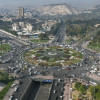A new dawn for Syria

With the end of former Syrian President Bashar al-Assad's brutal 24-year reign on December 8, the Syrian people finally have an opportunity to now rebuild their nation. Islamist-led rebel groups swept into Damascus, forcing Assad to flee to Russia, marking a spectacular end of five decades of Ba'ath Party rule in the country. After more than 13 years of civil war, during which Assad's forces ruthlessly suppressed protesters, his government collapsed in the face of a surprising 11-day offensive launched by rebel groups. Only weeks ago, few could have anticipated this dramatic turn in Syria's fate, which now stands at a crossroads as the Middle East grapples with widespread chaos and instability.
Following Assad's ouster, huge crowds were seen cheering in the streets of Damascus. Prisoners held in notorious black sites were reportedly freed by the rebels. Notably, Assad's reign ended after Hayat Tahrir al-Sham (HTS)—listed as a terrorist organisation by Western governments and others, including Russia—captured the strategic city of Homs. However, HTS and other rebel groups themselves have dubious human rights records. Given this reality, the UN war crimes investigators have urged those now taking charge in Syria to ensure that the atrocities committed under Assad's rule are not repeated.
Since the start of the most recent rebel offensive, it is estimated that at least 910 people have been killed, including 138 civilians. The war in Syria has already claimed a conservative estimate of 500,000 lives and displaced nearly half of the country's population. It is, therefore, imperative that, with the fall of the previous regime, the country moves forward and begins to heal. The first step towards stability is ending the violence, with all parties in Syria engaging in dialogue to reach a solution that reflects people's will. Moreover, it is crucial that the transition of power proceeds peacefully and that all ethnic, religious and social groups in the country are protected from persecution.
Despite Assad's ruthless actions against his own people, internal factors were not the sole drivers of his regime's collapse. Syria became a battleground for geopolitical rivalries, as external powers exploited the crisis to further their own agendas. Already after the regime change, Israel has seized territory in Syria-controlled areas of the Golan Heights, with its prime minister ordering forces to establish a buffer zone in the region. Reports also indicate that Israel has resumed bombing campaigns in Syria, violating international law and further exacerbating uncertainty both within the country and across the region.
Given the years of suffering endured by the Syrian people—caused by both internal and external factors—it is imperative that foreign interference in the country comes to an end. While the international community should step forward to provide aid and funding for Syria's reconstruction, foreign powers must cease using the country as a pawn in their geopolitical chessboards. The future of Syria must be determined by its own people. Only then can the nation truly reap the benefits of ousting a brutal dictator.
Follow The Daily Star Opinion on Facebook for the latest opinions, commentaries and analyses by experts and professionals. To contribute your article or letter to The Daily Star Opinion, see our guidelines for submission.


 For all latest news, follow The Daily Star's Google News channel.
For all latest news, follow The Daily Star's Google News channel. 









Comments